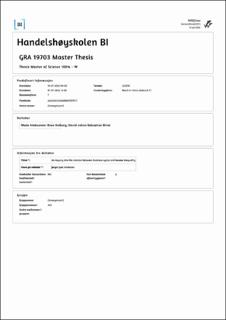An inquiry into the relation between Business cycles and Income Inequality
Master thesis

View/
Date
2022Metadata
Show full item recordCollections
- Master of Science [1621]
Abstract
We evaluate the role of business cycles and some key economic indicators on
income disparity within- and between municipalities. We decompose Norwegian
mainland GDP between 2006-2017 to a cyclical and trend component and
key macroeconomic variables which vary within municipalities. Using Mundlak’s
correlated-random effects model we estimate the effect of the business
cycle on official inequality measures, the Gini-coefficient and P90/P10. These
measures are complemented by a set of individual income measures and fractiles
constructed from pensionable- and general income which aims to capture
distributional changes. We find that the business cycle is regressive within
municipalities while the underlying trend component has an equalizing effect.
The between-municipality effects are ambiguous, some evidence speak for a
regressive behaviour of the trend component and from the estimated withinand
contextual effects it is difficult to infer significant between-effects
Description
Masteroppgave(MSc) in Master of Science in Applied Economics - Handelshøyskolen BI, 2022